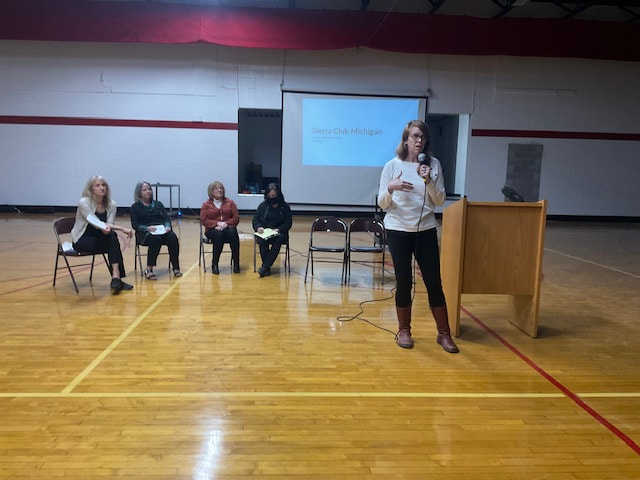 Walkerville PFAS public meeting presenters (L-R): Cheryl Ruble (Sierra Club anti-CAFO advocate) , Denise Trabbic-Pointer (Sierra Club scientist), Sandy Wynn-Stelt (citizen contaminated from Rockford area PFAS site, with Great Lakes PFAS Action Network), Pegg Clevenger (Sierra Club Food & Agriculture Team). Photo by Sally Wagoner By Sally Wagoner, Newaygo County Environmental Coalition
Northwest Newaygo and east Oceana Counties are newly identified PFAS ground zero areas in Michigan where these toxic chemicals have been found in the soil, private wells, irrigation wells, ground water and local Beaver Creek. Two public meetings have taken place in Walkerville since July to inform the residents of the contamination. On July 22, EGLE’s MPART (Michigan PFAS Action Response Team) led a town hall meeting that first informed residents of the contamination. More recently, on November 2, Walkerville Thrives officers Deanna Helminger and Emma Kirwan, along with Michigan Sierra Club, held a meeting to help the residents further understand the health risks of PFAS, educate on how to lessen continued exposure, and learn what government and outside agencies and organizations are doing to remediate the environment, private properties, and individual health and economic tolls. Contamination of the Longview and Hilltop fields owned by Eagle Ottawa Newaygo Farms in Leavitt (Oceana Co.) and Beaver (Newaygo Co.) Townships began in 1994. The original source of PFAS and other contaminants came from the Eagle Ottawa Leather Company’s tannery in Grand Haven, which operated from 1916 to 2007. In 1994 the company began reclaiming waste from the tannery and applying it to the agricultural farms which they purchased specifically for the disposal of the tannery waste. The waste was used at CAFOs (concentrated animal feed operations) in the area as well. The company also patented the compost and sold it as “ReTurn” to the public for application on fields, farms and home gardens. PFAS (Per- and Poly-fluoroalkyl Substances) are synthetic, human created chemicals developed in the 1950’s and utilized heavily in common products and uses such a non-stick cookware, food packaging, water proof fabrics, clothing, camping gear, furniture, carpets, cosmetics, firefighting foams and other areas. PFAS are sometimes called the “Forever Chemicals” as they do not break down under typical environmental conditions. Some of the 9,000 types of PFAs can last for over 1,000 years. The health risks of PFAS is still in the early stages of research, but may include decreased infant birth weights, high blood pressure and pre-eclampsia in pregnant women, kidney and testicular cancer, poor vaccine response with sub-therapeutic immune response to disease, liver enzyme changes that may indicate liver damage, thyroid disease, increased cholesterol blood levels that can lead to heart attacks and stroke. In the human body, PFAS may hypothetically degrade or be eliminated from blood, organs and over a long period of time. However, the possibility of someone actually becoming free of PFAs is unlikely, as daily exposure to PFAS from the soil, food, water, air and everyday products continue to add to the accumulation in the body. Other PFAS sites have also been identified in Newaygo County. One is a previous landfill site north of Fremont (Kunnen’s Landfill) at 3897 Ramshorn. Three of eight groundwater wells have levels of PFOA and PFOS that exceed clean-up criteria. The other site is surface water at Williams Creek (also called Lynne Drain) at South Baldwin which show low levels of PFAS and related chemicals but at less than those considered toxic. The Muskegon River at the very southwest corner of Newaygo County has been monitored for low levels of PFAS as well. At this time there are no known methods of eliminating or breaking down PFAS in the environment or in animal and human bodies. According to information gleaned from EGLE, MPART and the Sierra Club, the best ways to deal with PFAS are:
The County of Newaygo is appraised of new and ongoing PFAS investigations in our area, although there is no point person or department to monitor or reach out to the communities affected. The regional Department of Health (DHD #10) tracks water test results, blood tests, and refers community members to the certified water filters that can be used to decrease PFAS from private wells for home use. For further PFAS information, these resources are available: MPART – Michigan PFAS Action Response Team (www.michigan.gov/pfasresponse). EGLE site lead for the Kunnen’s Landfill site in Fremont is Kent Walters, 616-278-4350, [email protected] EGLE site lead for the Walkerville area is Aaron Assmann, 616-430-5275, [email protected]. DHD #10 - www.dhd10.org/pfas-response, 231-902-8528 Sierra Club, www.sierraclub.org/michigan/PFAS-in-Michigan. A virtual summit by EGLE will be held December 5 – 7 that is open to the public. To register, go to: https://www.michigan.gov/egle/outreach/upcoming-events/2022/12/05/2022-great-lakes-pfas-summit From the Summit description: “Participants will include local, state, and federal government officials; environmental consultants and vendors; academic researchers and students; industry managing PFAS contamination; and community organizations.” “Community members need to be concerned about these PFAS reports, even if it seems we may live far from a contaminated site,” states Sally Wagoner of the Newaygo County Environmental Coalition (NCEC). “PFAS is everywhere. Even polar bears in the Arctic Circle have been found to have high concentrations of PFAS in their livers as these chemicals have been let loose in almost every product of our modern lives.” “The Newaygo County Environmental Coalition will continue to be aware of and report on our local PFAS concerns,” Ms. Wagoner continued. “Anyone with a special interest in this area, or anyone with a passion and concern for our local environment, can become involved.” NCEC can be followed on Facebook @Newaygo County Environmental Coalition. Or contact NCEC: [email protected]; 231-519-3419.
0 Comments
Your comment will be posted after it is approved.
Leave a Reply. |
Letter to the Editor PolicyNear North Now welcomes original letters from readers on current topics of general interest. Simply fill out the form below. Letters submissions are limited to 300 words. Archives
July 2024
Categories |
 RSS Feed
RSS Feed